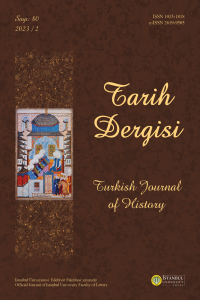İlmiye Mesleği İstihdamında Usülsüzlük İddiaları Üzerine Kanuni’nin Emriyle Yapılan Kapsamlı bir Tahkikat
Abstract
Osmanlı Devlet teşkilatında kazaskerler Divan-ı Hümayun üyesi olmanın yanında yargı ve öğretim sistemininin düzenlenmesi ve işleyişinden sorumlu idi. Kazaskerlerin zaman zaman sorumluluklarını ihmâl etmeleri, usülsüz davranmaları sebebiyle görevden alındıkları, hatta haklarında tahkikat ve teftiş yapıldığı bilinmektedir. Bu konuda üzerinde durulmağa değer bir misâl 1551 yılında Anadolu Kazaskeri Sinan Efendi’nin kazaskerlikten azli ve sonra dört yıllık kazaskerliği dönemindeki idarî uygulamalarının teftiş edilmesidir. Bu tahkikatta 196 şikâyetçi, uğradıkları haksızlıkları tek tek dile getirmekte ve Sinan Efendi’ye her bir şikâyet hakkındaki cevabı sorulmaktadır. Öne sürülen şikâyetler ve kazaskerin verdiği cevaplar ilmiye teşkilatının işleyişini tanıtması ve olayların perde arkasını yansıtması bakımından son derece önemlidir. Bu örneklerden hareketle ilmiye teşkilatını ve mensuplarını şiddetle eleştirmek mümkündür. Ancak bu olumsuz misallerden genel hükümler çıkararak, imparatorluk çapında yargı ve eğitim teşkilatına sahip olan ilmiye kariyeri hakkında karamsar sonuç ortaya koymak ciddi bir metodoloji hatasına düşmek olur. Burada haksızlığa uğrayanların şikâyetlerinin toplanıp bir dosya oluşturulduğunu düşünerek değerlendirme yapmak gerekir.
Keywords
Tahkikat teftiş yargılanma mülazemet kadı müderris kazasker Sinan Efendi Kanuni Sultan Süleyman
References
- Kütüphane Kaynağı google scholar
- Topkapı Sarayı Müzesi Kütüphanesi (TSMK) google scholar
- Tahkikat Defteri (Mecmû’a-yı Muhâkemât-ı Defter-i Eslâf), R. 1506 Mükerrer. google scholar
- Atâ’î, Hadâ’iku’l-hakâ’ik fî tekmileti’ş-Şaka’ik, haz. A. Özcan, İstanbul 1979. google scholar
- Beyazıt, Yasemin, Osmanlı İlmiye Mesleğinde İstihdam (XVI. Yüzyıl), TTK, Ankara 2014. google scholar
- Emecen, F. M., Kanuni Sultan Süleyman, Ankara 2022. google scholar
- Gel, M., “Kanunî Devrinde Vüzerâ Gölgesinde Vakfa İlave Mülkün Satışı Üzerine Hukukî Tartışma: Da’va-yı Asiyâb”, Belleten, LXXXVII/280 (2013), s. 927-953. google scholar
- Gelibolulu Mustafa Âlî, Mevâ‘idü’n-nefâ’is fi kavâ’idi’l-mecâlis, haz. Mehmet Şeker, TTK, Ankara 1997. google scholar
- Koçi Bey Risâlesi, haz. Yılmaz Kurt, Ankara 2021. google scholar
- Selânikî Mustafa Efendi, Tarih-i Selânikî, haz. Mehmet İpşirli, Ankara 1999. google scholar
- Yurdaydın, H. G., Matrakçı Nasuh, Ankara 1963. google scholar
A Comprehensive Investigation on Allegations of Irregularities in the Employment of the Learned Profession in the Age of Suleyman the Magnificent
Abstract
In the Ottoman administrative system, alongside being members of the Imperial Council (Divan-ı Hümayun), kazaskers were also responsible for the regulation and functioning of the judiciary and education system. Kazaskers were sometimes dismissed from their posts and subjected to investigations and inspections on the grounds that they failed to fulfill their responsibilities or engaged in inappropriate behavior. An example worth mentioning in this regard is the dismissal of Sinan Efendi, the Kazasker of Anatolia, from the office in 1551 and the subsequent inspection of his administrative practices during his four years of service. In this investigation, about two hundred complainants individually expressed the injustices they had exposed and Sinan Efendi was asked to respond to each complaint. The complaints raised and the responses given by the Kazasker are extremely important in terms of introducing the functioning of the ilmiye institution and reflecting the behind-the-scenes events. The terminology utilized in the ilmiye career, as well as the richness of their meanings and the forms they took in practice are also noteworthy. Based on this and other examples, it is possible to criticize the ilmiye organization and its members severely. However, it would be a serious methodological error to draw general conclusions from these negative examples and to present a pessimistic picture about the ilmiye career, which operated as an empire-wide judicial and educational organization. Here, this issue should be assessed by considering how the complaints of those who had been wronged were collected and how the files were created.
Keywords
Investigation inspection judgement mulazemet judge muderris kazasker Suleiman the Magnificent
References
- Kütüphane Kaynağı google scholar
- Topkapı Sarayı Müzesi Kütüphanesi (TSMK) google scholar
- Tahkikat Defteri (Mecmû’a-yı Muhâkemât-ı Defter-i Eslâf), R. 1506 Mükerrer. google scholar
- Atâ’î, Hadâ’iku’l-hakâ’ik fî tekmileti’ş-Şaka’ik, haz. A. Özcan, İstanbul 1979. google scholar
- Beyazıt, Yasemin, Osmanlı İlmiye Mesleğinde İstihdam (XVI. Yüzyıl), TTK, Ankara 2014. google scholar
- Emecen, F. M., Kanuni Sultan Süleyman, Ankara 2022. google scholar
- Gel, M., “Kanunî Devrinde Vüzerâ Gölgesinde Vakfa İlave Mülkün Satışı Üzerine Hukukî Tartışma: Da’va-yı Asiyâb”, Belleten, LXXXVII/280 (2013), s. 927-953. google scholar
- Gelibolulu Mustafa Âlî, Mevâ‘idü’n-nefâ’is fi kavâ’idi’l-mecâlis, haz. Mehmet Şeker, TTK, Ankara 1997. google scholar
- Koçi Bey Risâlesi, haz. Yılmaz Kurt, Ankara 2021. google scholar
- Selânikî Mustafa Efendi, Tarih-i Selânikî, haz. Mehmet İpşirli, Ankara 1999. google scholar
- Yurdaydın, H. G., Matrakçı Nasuh, Ankara 1963. google scholar
Details
| Primary Language | Turkish |
|---|---|
| Subjects | African Political History |
| Journal Section | Articles |
| Authors | |
| Publication Date | July 10, 2023 |
| Published in Issue | Year 2023 Issue: 80 |

